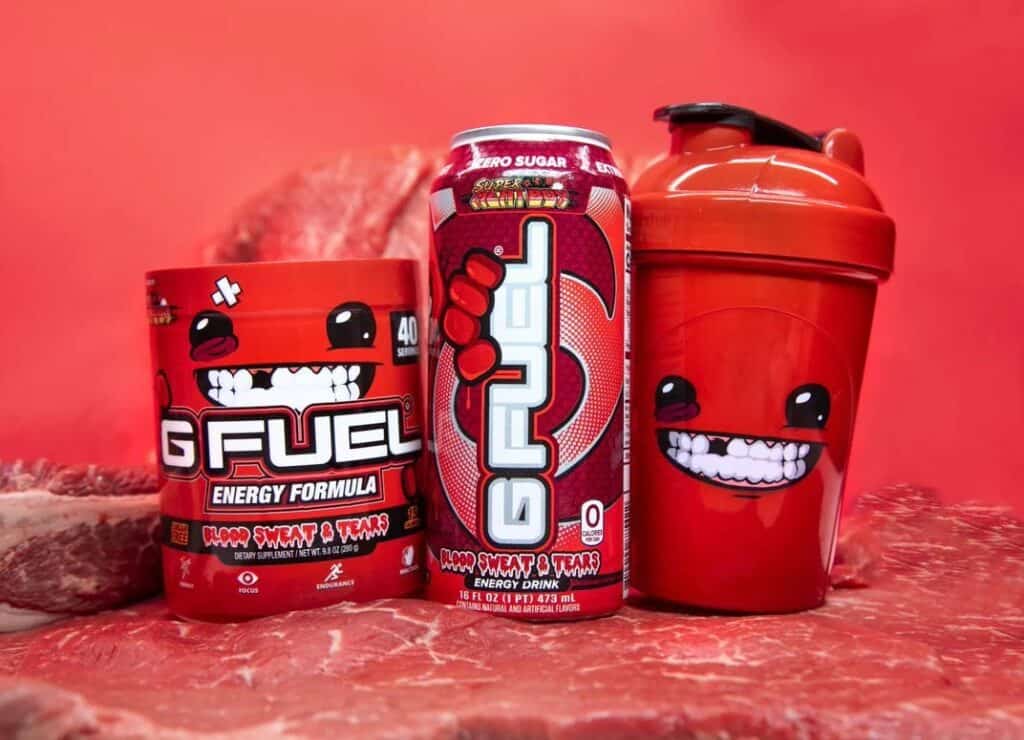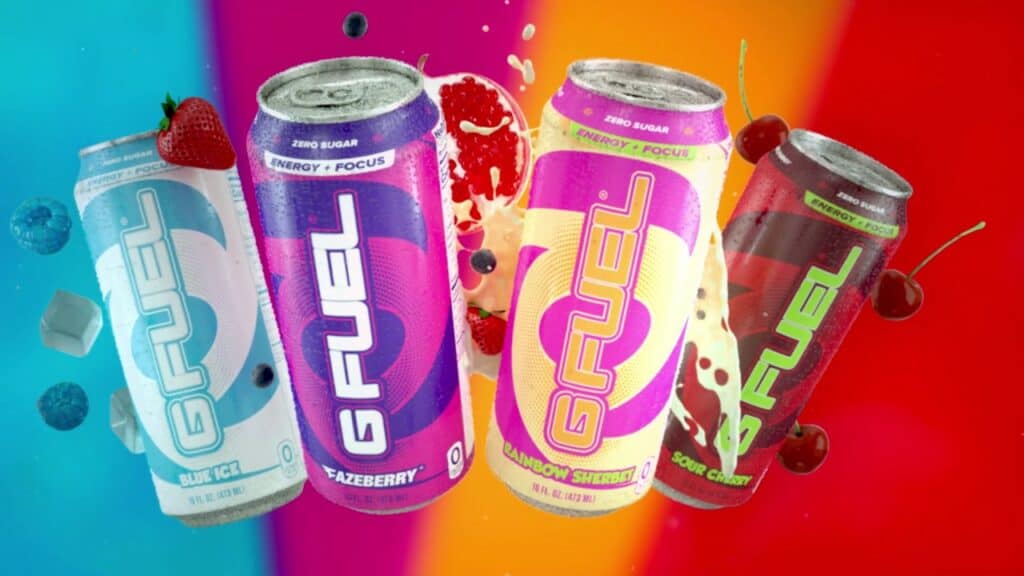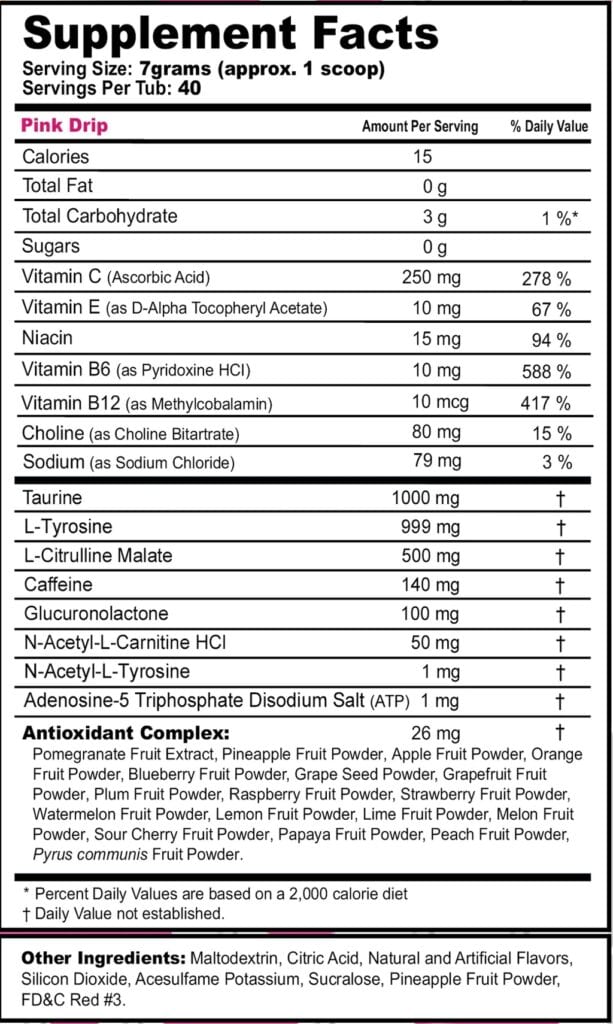Parents often wonder what their children should and shouldn’t consume. One popular energy drink that has gained popularity in recent years is GFuel.
However, many parents are unsure if it is safe for their 11-year-old children to drink. Can 11-year olds drink Gfuel? In this article, we will explore the safety of GFuel for children and the potential health impacts it may have.
GFuel is a popular energy drink that is marketed towards gamers and athletes. It is advertised as a healthy alternative to other energy drinks, with claims of being sugar-free and packed with vitamins.
However, with its high caffeine content, parents are right to be concerned about its safety for children. In the following sections, we will examine the nutritional value of GFuel, the caffeine content, and the health impact it may have on 11-year-olds.

Key Takeaways
- GFuel is a popular energy drink marketed towards gamers and athletes.
- GFuel contains high levels of caffeine, which may be harmful to 11-year-olds.
- Parents should consider alternative, healthier options for their children.
1. Understanding GFuel

GFuel is a type of energy drink that is marketed as a supplement to provide an energy boost. It is often consumed by gamers, athletes, and fitness enthusiasts who are looking for a quick and easy way to increase their energy levels.
GFuel comes in a variety of flavors, including blue ice, peach mango, and sour cherry.
GFuel is different from other energy drinks in that it does not contain sugar. Instead, it is sweetened with a combination of artificial sweeteners, including sucralose and acesulfame potassium.
This makes GFuel a low-calorie alternative to traditional energy drinks that can contain as much as 50 grams of sugar per serving.
GFuel also contains a variety of other ingredients that are designed to provide a boost of energy. These include caffeine, taurine, and vitamins B6 and B12.
While GFuel is marketed as a supplement, it is important to note that it is not regulated by the FDA and should not be used as a replacement for a healthy diet and exercise.
When it comes to children and GFuel, it is generally not recommended for children under the age of 18 to consume energy drinks. This is because children are more susceptible to the effects of caffeine and other stimulants found in energy drinks.
While GFuel does contain less caffeine than some other energy drinks, it is still important to exercise caution when giving it to children.
In summary, GFuel is a low-calorie energy drink that is marketed as a supplement to provide an energy boost. While it contains a variety of ingredients that are designed to provide this boost, it is important to exercise caution when giving it to children and to use it as part of a healthy diet and exercise routine.
2. Is GFuel Safe For Children?

GFuel is a popular energy drink that is marketed towards gamers and athletes. It is a powdered drink mix that comes in a variety of flavors and is designed to provide a boost of energy and focus.
However, many parents have concerns about whether or not GFuel is safe for children, particularly 11-year-olds.
According to the American Academy of Pediatrics, energy drinks like GFuel are not recommended for children or adolescents. These drinks can contain high levels of caffeine, sugar, and other stimulants that can be harmful to young children’s developing bodies.
The FDA also warns that energy drinks can cause adverse health effects, including heart palpitations, seizures, and even death.
While GFuel does contain some natural ingredients like green tea extract and antioxidants, it also contains high levels of caffeine and sugar. One serving of GFuel can contain up to 150mg of caffeine, which is equivalent to the amount found in a cup of coffee.
This amount of caffeine can cause jitters, anxiety, and other adverse effects in children.
It is important to note that GFuel is not regulated by the FDA, and there is limited research on its safety and efficacy. While some athletes and gamers swear by GFuel for its energy-boosting properties, it is not recommended for children or young adolescents.
If you are concerned about your child’s energy levels, it is best to consult with a doctor or pediatrician. They can provide guidance on safe and healthy ways to boost energy, such as getting enough sleep, eating a balanced diet, and engaging in regular exercise.
3. The Caffeine Content in GFuel

GFuel is a popular energy drink among gamers and athletes alike. It is marketed as a healthy alternative to other energy drinks, but it is important to understand the caffeine content in GFuel before consuming it, especially for 11-year-olds.
Caffeine is a stimulant that can have both positive and negative effects on the body. It can increase alertness, improve mood, and enhance physical performance.
However, consuming too much caffeine can lead to negative side effects such as anxiety, jitters, heart palpitations, and difficulty sleeping.
GFuel contains caffeine, with each serving containing approximately 150mg of caffeine. This is roughly equivalent to the amount of caffeine in a cup and a half of brewed coffee or two cups of black tea.
It is important to note that the recommended daily caffeine intake for children aged 12 and under is 2.5mg per kilogram of body weight.
Compared to other energy drinks, GFuel has a lower caffeine content. For example, a can of Monster Energy contains approximately 160mg of caffeine per serving, while a can of Red Bull contains approximately 80mg of caffeine per serving.
It is important to monitor caffeine intake, especially for children. Parents should consider their child’s age, weight, and overall health before allowing them to consume GFuel or other caffeinated beverages.
It is also important to monitor how much caffeine is consumed from other sources such as coffee, tea, and soda.
In summary, GFuel contains caffeine, with each serving containing approximately 150mg of caffeine. Parents should consider their child’s age, weight, and overall health before allowing them to consume GFuel or other caffeinated beverages.
It is also important to monitor caffeine intake from other sources.
4. Health Impact of GFuel on 11-Year-Olds

GFuel is a popular energy drink among gamers and athletes. It contains caffeine, amino acids, vitamins, and other ingredients that claim to enhance focus, energy, and endurance.
However, the safety and efficacy of GFuel for children and adolescents, particularly 11-year-olds, are still a matter of debate.
According to the American Academy of Pediatrics, caffeine intake in children should be limited to 2.5 mg/kg/day or less. For an 11-year-old who weighs around 36 kg, this translates to a maximum of 90 mg of caffeine per day.
GFuel, on the other hand, contains 150 mg of caffeine per serving, which is more than the daily limit recommended for children.
Excessive caffeine intake can cause a range of health problems, such as increased heart rate, high blood pressure, headaches, insomnia, anxiety, jitters, jitteriness, hyperactivity, irritability, heart palpitations, restlessness, nausea, and even death in rare cases. These side effects are more pronounced in children and adolescents who have lower tolerance to caffeine and may experience adverse reactions even at lower doses.
Furthermore, GFuel is not regulated by the FDA as a dietary supplement or a food additive, which means that its safety and quality are not guaranteed. Some studies have found that energy drinks, including GFuel, can cause dental erosion, dehydration, and other health problems in children and adolescents.
In conclusion, 11-year-olds should avoid consuming GFuel or any other energy drink that contains high amounts of caffeine and other stimulants. Instead, they should stick to a healthy and balanced diet, get enough sleep, and exercise regularly to maintain their energy and focus levels.
Parents and caregivers should also educate their children about the risks of energy drinks and monitor their caffeine intake to prevent any adverse effects.
5. Nutritional Value of GFuel

GFuel is a popular energy drink brand that is marketed towards gamers and athletes. It is a sugar-free and low-calorie energy drink that is designed to provide an energy boost without the crash associated with traditional energy drinks.
One serving of GFuel contains 25 calories, which is significantly lower than most traditional energy drinks. It is also sugar-free, making it a healthier alternative to sugary drinks.
Instead of sugar, GFuel uses artificial sweeteners such as Stevia to provide sweetness without the added calories.
GFuel is also packed with vitamins and minerals such as Vitamin C and Vitamin B6, which are essential for maintaining good health. In addition, it contains electrolytes that help to maintain proper hydration levels in the body.
The drink also contains amino acids such as Taurine and L-Theanine, which are known for their ability to improve mental focus and reduce stress. These amino acids work together to provide a calm and focused energy boost, making it an ideal choice for gamers and athletes alike.
Finally, GFuel contains antioxidants that help to protect the body from damage caused by free radicals. These antioxidants work to keep the body healthy and functioning properly.
Overall, GFuel is a healthy and nutritious energy drink that is suitable for 11-year-olds. Its low calorie and sugar-free formula make it a healthier alternative to traditional energy drinks, while its blend of vitamins, minerals, and amino acids make it an ideal choice for improving mental focus and reducing stress.
6. Alternatives to GFuel for 11-Year-Olds

While GFuel may not be suitable for 11-year-olds due to its high caffeine content, there are plenty of alternatives that can provide a similar energy boost without the negative side effects.
One healthy alternative is to focus on hydration. Drinking plenty of water can help keep the body hydrated and energized.
Additionally, water can help flush out toxins and keep the body functioning properly.
For those who prefer flavored drinks, there are many caffeine-free options available. Soda and cola may be popular choices, but they are loaded with sugar and artificial ingredients.
Instead, try switching to a healthier alternative such as a fruit juice or iced tea.
Another option is to choose a soft drink that is caffeine-free. Many brands offer caffeine-free versions of their popular drinks, which can be a great way to enjoy the taste without the added caffeine.
In addition to choosing healthy alternatives, it’s also important to maintain a healthy diet and lifestyle. Eating a balanced diet that includes plenty of fruits, vegetables, and whole grains can provide the body with the nutrients it needs to function properly.
Regular exercise can also help boost energy levels and improve overall health.
Overall, there are many alternatives to GFuel that can provide a similar energy boost without the negative side effects. By focusing on hydration, choosing healthy alternatives, and maintaining a healthy lifestyle, 11-year-olds can stay energized and healthy without relying on caffeine-laden drinks.
7. GFuel and Physical Activity

GFuel is a popular energy drink that is marketed towards gamers and athletes. It is a powdered energy drink mix that is designed to be mixed with water.
GFuel contains a variety of ingredients that are intended to boost energy levels and improve focus, including caffeine, taurine, and vitamins.
While GFuel can be a useful tool for athletes who are looking to improve their performance, it is important to be aware of the potential risks associated with consuming energy drinks. GFuel contains a significant amount of caffeine, which is a stimulant that can increase heart rate and blood pressure.
For athletes who engage in high-intensity sports, such as football or basketball, consuming GFuel before a game or practice session may help to improve focus and energy levels. However, it is important to be aware of the potential risks associated with consuming caffeine before physical activity.
One potential risk of consuming GFuel before physical activity is dehydration. Caffeine is a diuretic, which means that it can cause the body to lose water.
This can lead to dehydration, which can have a negative impact on athletic performance.
Overall, GFuel can be a useful tool for athletes who are looking to improve their energy levels and focus. However, it is important to be aware of the potential risks associated with consuming caffeine before physical activity.
Athletes should also be sure to stay hydrated and consume GFuel in moderation.
8. The Impact of GFuel on Cognitive Function

GFuel is a popular energy drink that is marketed towards gamers and athletes. It contains a blend of ingredients, including caffeine, taurine, and vitamins, that are designed to improve focus and alertness.
However, the question remains: can 11-year-olds drink GFuel without any negative effects on their cognitive function?
Research on the impact of energy drinks on cognitive function is limited, especially in children. However, studies have shown that excessive consumption of caffeine can lead to negative effects on cognitive function, including impaired memory and attention.
While GFuel does contain caffeine, it is important to note that the amount of caffeine in one serving is less than that of a typical cup of coffee. In addition, GFuel also contains other ingredients that may have a positive impact on cognitive function, such as taurine and vitamins.
It is important to consider individual differences when it comes to the impact of GFuel on cognitive function. Some individuals may experience improved focus and alertness after consuming GFuel, while others may experience negative effects such as jitters or anxiety.
Overall, the impact of GFuel on cognitive function in 11-year-olds is not well-researched. It is important to approach energy drinks with caution and to monitor the effects on cognitive function.
Parents should also consider alternative sources of energy, such as healthy snacks and adequate sleep, before turning to energy drinks.
9. GFuel and Sleep Patterns

GFuel is a popular energy drink that contains caffeine, vitamins, and other ingredients that are designed to boost energy and focus. However, parents may wonder if it is safe for their 11-year-old child to consume GFuel and how it may impact their sleep patterns.
Rest is essential for growing children, and studies have shown that caffeine can interfere with sleep quality and quantity. Difficulty sleeping can lead to fatigue, mood swings, and other health problems.
Therefore, it is essential to monitor caffeine intake, especially in younger children.
Moderation is key when it comes to GFuel consumption. The recommended daily caffeine intake for children is no more than 100mg, and GFuel contains 150mg of caffeine per serving.
It is crucial to note that caffeine content can vary depending on the flavor and serving size.
Parents should encourage their children to avoid consuming GFuel before bedtime to prevent sleep disturbances. Caffeine has a half-life of approximately five hours, which means that it takes about five hours for the body to eliminate half of the caffeine consumed.
Therefore, it is best to avoid consuming caffeine at least five hours before bedtime.
In conclusion, GFuel can impact sleep patterns in children if consumed in excessive amounts or close to bedtime. Parents should monitor their child’s caffeine intake and encourage moderation to prevent sleep disturbances.
Final Thoughts

In conclusion, the question of whether or not 11-year-olds should drink Gfuel is a complex one. While the product is marketed as a performance-enhancing energy drink, it is important to consider the potential health risks associated with consuming high levels of caffeine and other stimulants.
Maintaining a healthy lifestyle is important for people of all ages, and excessive consumption of energy drinks can have negative impacts on overall health. Moderation is key, and parents should carefully consider the risks and benefits before allowing their children to consume Gfuel.
It is always recommended to consult with a doctor or healthcare professional before making any significant changes to one’s diet or lifestyle. They can provide guidance on what is best for each individual’s unique needs and circumstances.
Overall, while Gfuel may provide a temporary boost in energy and focus, it is important to weigh the potential risks and make an informed decision.
Also, read some similar posts:
Frequently Asked Questions
What is the recommended age for consuming G FUEL?
G FUEL is marketed as an energy drink for gamers and athletes. According to the manufacturer’s website, the product is not recommended for children under the age of 13.
Are there any health risks associated with children drinking G FUEL?
G FUEL contains caffeine, which can have adverse effects on children’s health. The American Academy of Pediatrics recommends that children between the ages of 12 and 18 should not consume more than 100 mg of caffeine per day. G FUEL contains 150 mg of caffeine per serving, which is more than the recommended amount for children.
Is G FUEL safe for pre-teens?
G FUEL is not recommended for pre-teens. The product contains high levels of caffeine, which can have negative effects on children’s health.
What are the potential side effects of drinking G FUEL at a young age?
The potential side effects of drinking G FUEL at a young age include increased heart rate, high blood pressure, anxiety, and insomnia. Children who consume high amounts of caffeine may also experience withdrawal symptoms, such as headaches and fatigue.
Can G FUEL affect children’s behavior or performance in school?
Consuming high amounts of caffeine can affect children’s behavior and performance in school. Caffeine can cause restlessness, irritability, and difficulty concentrating. Children who consume high amounts of caffeine may also experience difficulty sleeping, which can negatively impact their academic performance.
Are there any alternative energy drinks or supplements that are safer for children than G FUEL?
There are alternative energy drinks and supplements that are safer for children than G FUEL. However, it is important to note that energy drinks and supplements are not necessary for children’s health and well-being. Children can get the energy they need from a balanced diet and regular exercise.

Iesha is a loving mother of 2 beautiful children. She’s an active parent who enjoys indoor and outdoor adventures with her family. Her mission is to share practical and realistic parenting advice to help the parenting community becoming stronger.
